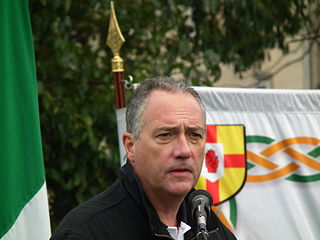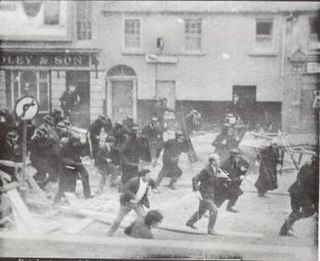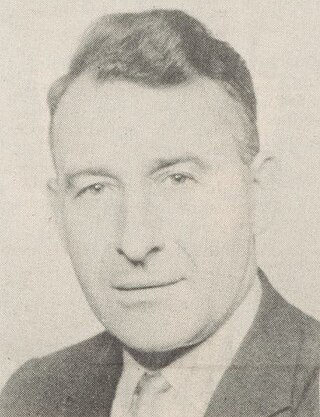
Séanna Walsh or Séanna Breathnach is a Sinn Féin member of Belfast City Council and a former volunteer in the Provisional Irish Republican Army (IRA).

HM Prison Belfast, also known as Crumlin Road Gaol, is a former prison situated on the Crumlin Road in north Belfast, Northern Ireland. Since 1996 it is the only remaining Victorian era former prison in Northern Ireland. It is colloquially known as the Crum.
Thomas Joseph Williams was a volunteer in C Company, 2nd Battalion of the Belfast Brigade in the Irish Republican Army from the Bombay Street area of Belfast, Northern Ireland. He was hanged in the Crumlin Road Gaol for his involvement in the killing of Royal Ulster Constabulary (RUC) police officer Patrick Murphy during the Northern Campaign.
The Northern campaign was a series of attacks by the Irish Republican Army (IRA) Northern Command between September 1942 and December 1944 against the security forces in Northern Ireland. The action taken by the Northern Irish and the Irish governments as a result of these attacks shattered the IRA and resulted in the former being free from IRA activity by the end of World War II. In December 1956 the IRA began its Border Campaign which lasted until February 1962.
Jimmy Steele was an Irish republican militant. He was one of the most prominent Irish Republican Army (IRA) men in Belfast after the Irish Civil War who held practically every senior position in the Northern Command of the IRA. Later in life Steele publicly denounced the leadership of the IRA which was a prelude to the split in the IRA. Steele founded and edited several Irish Republican publications. Steele spent a large portion of his life in jails as a result of his actions against British security forces.

Derry Gaol, also known as Londonderry Gaol, refers to one of several gaols (prisons) constructed consecutively in Derry, Northern Ireland. Derry Gaol is notable as a place of incarceration for Irish Republican Army (IRA) members during the Irish Civil War, and for its numerous executions, seven of which took place between 1820 and 1923. On Christmas day 1939 interned Irish Republican prisoners took control of the jail, protesting their continued imprisonment without charges or trials. On 20 March 1943, 21 Irish Republican prisoners tunneled their way out of Derry Jail with the assistance of Jimmy Steele (republican). This escape was referred to as "The Big Derry Jail Escape".
Seán McCaughey was an Irish militant and Republican activist. He was an Irish Republican Army (IRA) leader in the 1930s and 1940s and hunger striker.

During 12–16 August 1969, there was an outbreak of political and sectarian violence throughout Northern Ireland, which is often seen as the beginning of the thirty-year conflict known as the Troubles. There had been sporadic violence throughout the year arising out of the Northern Ireland civil rights campaign, which demanded an end to discrimination against Catholics and Irish nationalists. Civil rights marches had been attacked by Protestant loyalists, and protesters often clashed with the Royal Ulster Constabulary (RUC), the overwhelmingly Protestant police force.
Billy McKee was an Irish republican and a founding member and leader of the Provisional Irish Republican Army.

Martin Meehan was a Sinn Féin politician and former volunteer in the Provisional Irish Republican Army (IRA). Meehan was the first person to be convicted of membership of the Provisional IRA, and he spent eighteen years in prison during the Troubles.
Marian Donnelly is a former president of the Workers' Party and was a member of the former District Policing Partnership for the Magherafelt district of Northern Ireland.

Seán McCool was a prominent Irish Republican and a former chief of staff of the Irish Republican Army. Imprisoned on numerous occasions, both North and South of the border, he embarked on a number of hunger strikes in order to secure release. During the 1930s, McCool was one of the few socialists to remain in the IRA after the Republican Congress's decision to split. He stood as a candidate for the Irish Republican party Clann na Poblachta before leaving them as a result of their decision to go into government with Fine Gael.
Eamon Donnelly was an Irish politician.

Proinsias Mac Airt was an Irish republican activist and long-serving member of the Irish Republican Army.
Joe B. O'Hagan, aka J.B. O'Hagan was a Provisional IRA member.

Eoin McNamee was an Irish Republican and Chief of Staff of the Irish Republican Army.
Hugh Christopher Corvin was an Irish republican leader.

Harry White was an Irish republican paramilitary. Between 1935 and 1941 White was arrested multiple times and imprisoned in Crumlin Road Jail, Mountjoy Jail, Arbour Hill Prison and the Curragh Camp.
Patrick Donnelly was an Irish Republican Army volunteer, perhaps best known for his part in the Crumlin Road Gaol breakout of 1943.
Ned Maguire was an Irish Republican Army (IRA) volunteer from Belfast, Quartermaster of the IRA Northern Command and perhaps best known for his part in the Crumlin Road Gaol breakout of 1943.









